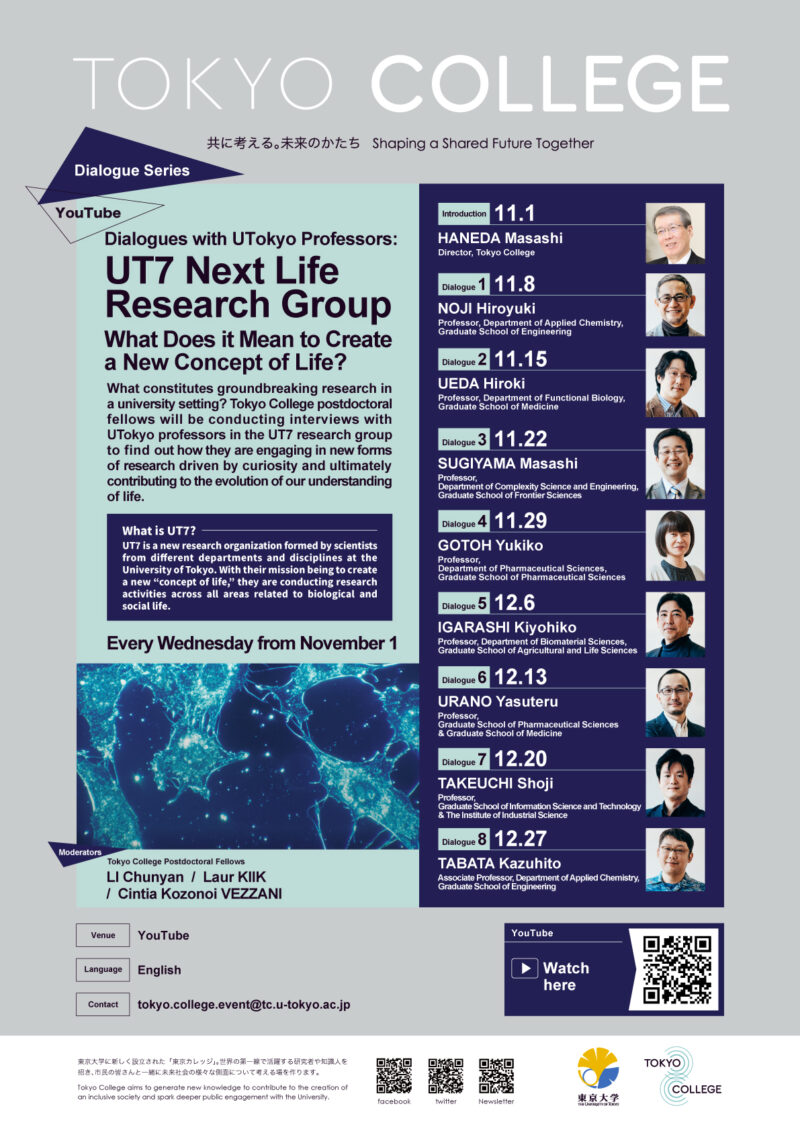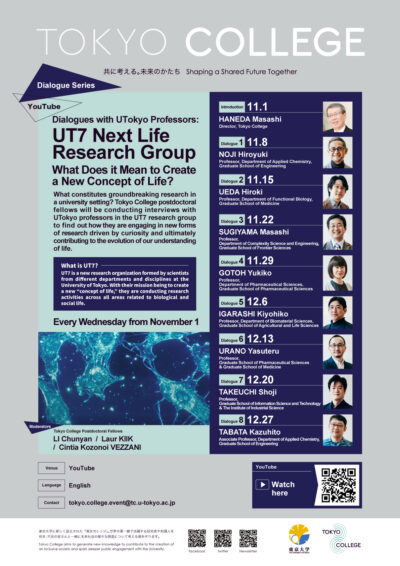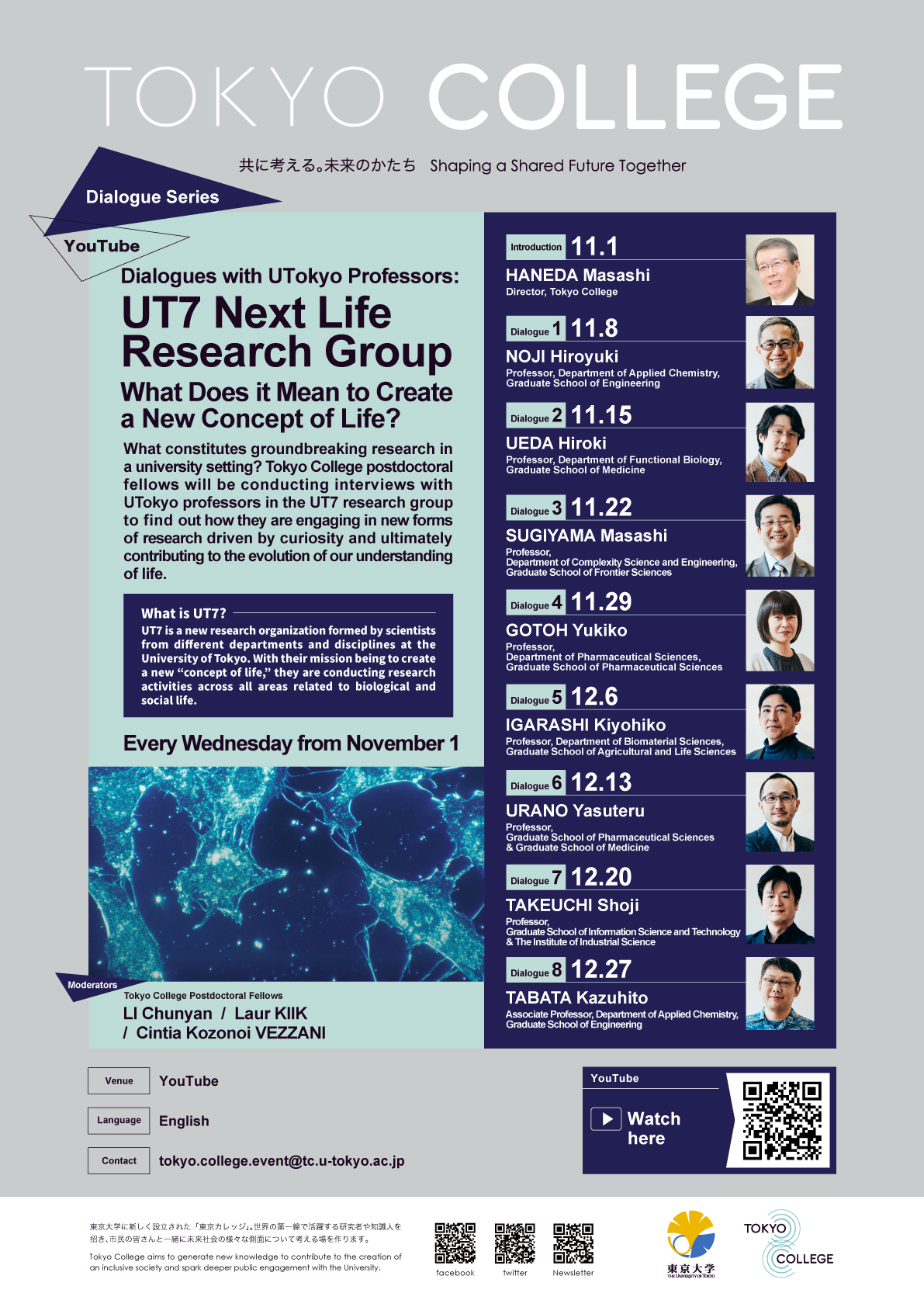Dialogues with UTokyo professors: UT7 Next Life Research Group What Does it Mean to Create a New Concept of Life?

| Date(s) | Every Wednesday from November 1, 2023 (Available from 17:00 JST) |
|---|---|
| Venue | |
| Language | English |
| Abstract |
What constitutes groundbreaking research in a university setting? Tokyo College postdoctoral fellows will be conducting interviews with UTokyo professors in the UT7 research group to find out how they are engaging in new forms of research driven by curiosity and ultimately contributing to the evolution of our understanding of life.
|
| Program |
2023.11.1 Introduction Speaker HANEDA Masashi (Tokyo College, The University of Tokyo)
2023.11.8 Dialogue 1 Speaker NOJI Hiroyuki (Professor, Department of Applied Chemistry, Graduate School of Engineering) In conversation with LI Chunyan, Laur KIIK, Cintia KOZONOI VEZZANI (Tokyo College, The University of Tokyo)
2023.11.15 Dialogue 2 Speaker UEDA Hiroki (Professor, Department of Functional Biology, Graduate School of Medicine) In conversation with Cintia KOZONOI VEZZANI (Tokyo College, The University of Tokyo)
2023.11.22 Dialogue 3 Speaker SUGIYAMA Masashi (Professor, Department of Complexity Science and Engineering, Graduate School of Frontier Sciences) In conversation with Cintia KOZONOI VEZZANI (Tokyo College, The University of Tokyo)
2023.11.29 Dialogue 4 Speaker GOTOH Yukiko (Professor, Department of Pharmaceutical Sciences, Graduate School of Pharmaceutical Sciences) In conversation with Cintia KOZONOI VEZZANI (Tokyo College, The University of Tokyo)
2023.12.6 Dialogue 5 Speaker IGARASHI Kiyohiko (Professor, Department of Biomaterial Sciences, Graduate School of Agricultural and Life Sciences) In conversation with Laur KIIK (Tokyo College, The University of Tokyo)
2023.12.13 Dialogue 6 Speaker URANO Yasuteru (Professor, Graduate School of Pharmaceutical Sciences & Graduate School of Medicine) In conversation with LI Chunyan (Tokyo College, The University of Tokyo)
2023.12.20 Dialogue 7 Speaker TAKEUCHI Shoji (Professor, Graduate School of Information Science and Technology & The Institute of Industrial Science) In conversation with Laur KIIK (Tokyo College, The University of Tokyo)
2023.12.27 Dialogue 8 Speaker TABATA Kazuhito (Associate Professor, Department of Applied Chemistry, Graduate School of Engineering) In conversation with LI Chunyan (Tokyo College, The University of Tokyo)
|
| Speaker Profile |
What is UT7? UT7 is a new research organization formed by scientists from different departments and disciplines at the University of Tokyo. With their mission being to create a new “concept of life,” they are conducting research activities across all areas related to biological and social life. |
| Organized by | Tokyo College, The University of Tokyo |















